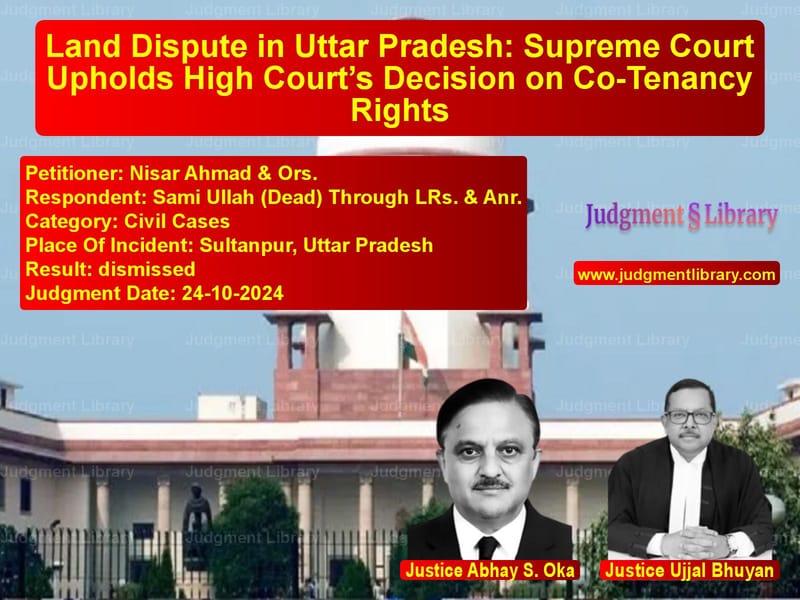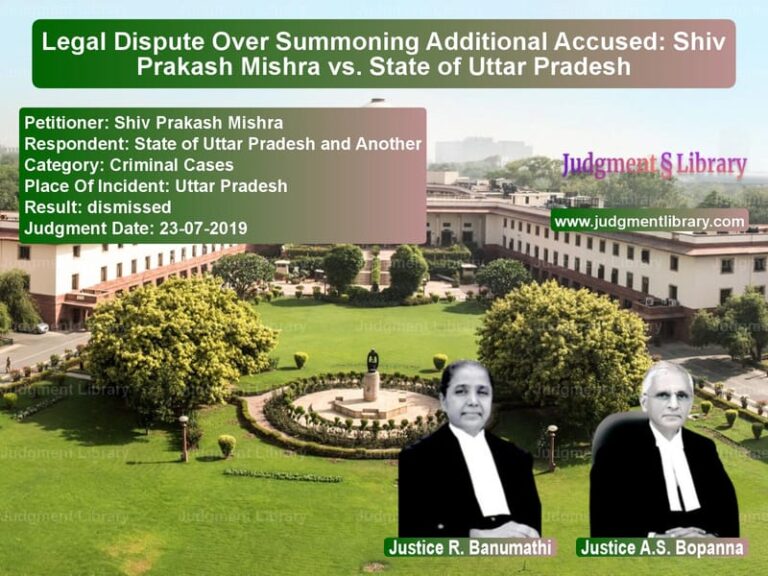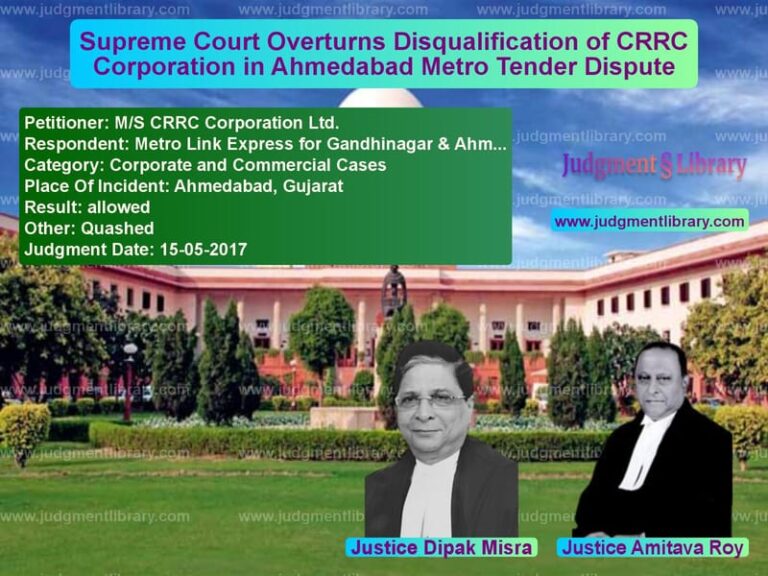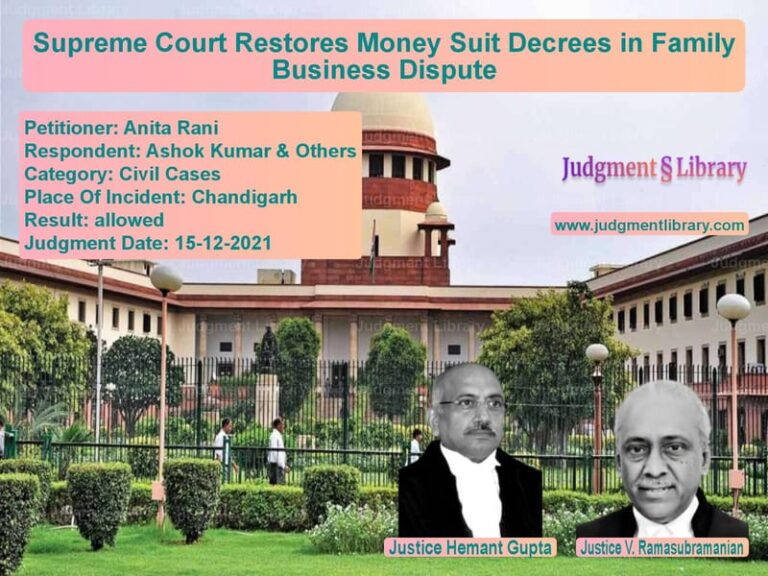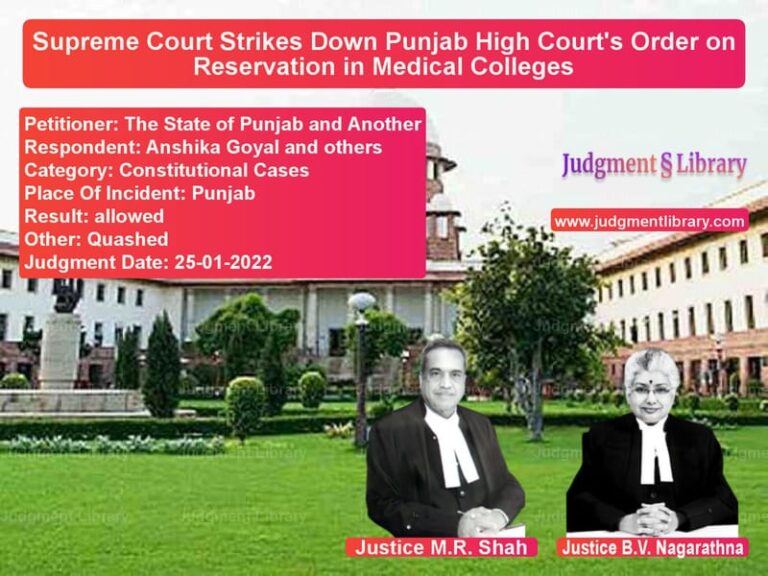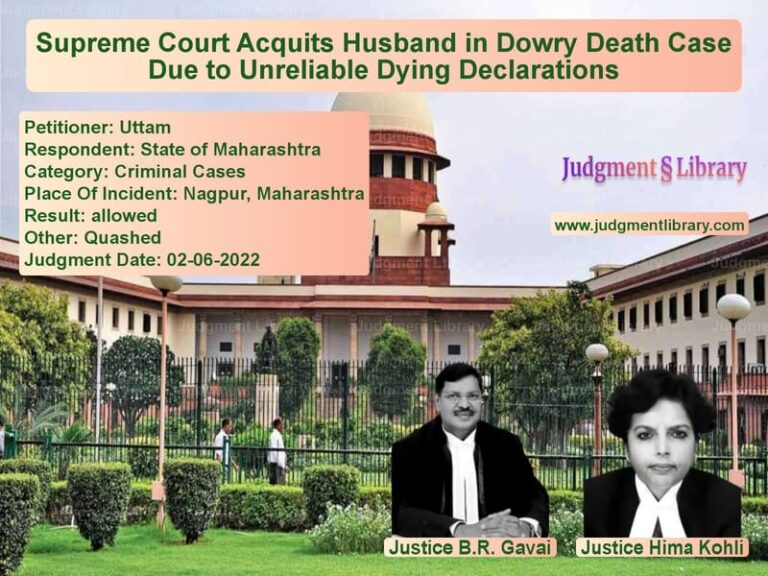Land Dispute in Uttar Pradesh: Supreme Court Upholds High Court’s Decision on Co-Tenancy Rights
The case of Nisar Ahmad & Ors. vs. Sami Ullah (Dead) Through LRs. & Anr. is a long-standing land dispute regarding co-tenancy rights in agricultural holdings in Uttar Pradesh. The Supreme Court had to determine whether the appellants had any co-tenancy rights in the disputed land and whether the High Court had erred in its decision.
Background of the Case
The dispute arose from agricultural land recorded under Khata Nos. 98, 99, and 100 in village Bhati Jarouli, District Sultanpur, Uttar Pradesh. The land was originally recorded in the name of Sami Ullah and his brother Badlu. The appellants, heirs of Zahoor Ahmed, claimed co-tenancy in these holdings.
The litigation began when Zahoor Ahmed filed an application under Section 9(2) of the Uttar Pradesh Consolidation of Holdings Act, 1953, before the Consolidation Officer, asserting a half-share in the disputed land.
Chronology of Legal Proceedings
- On December 6, 1972, the Consolidation Officer ruled in favor of Zahoor Ahmed, recognizing him as a co-tenant in Khata No. 99 while rejecting his claim in Khata No. 100.
- Sami Ullah and his brother Badlu challenged this order before the Assistant Settlement Officer, who upheld the ruling on April 25, 1973.
- Dissatisfied with the decision, Sami Ullah and his brother filed a revision petition before the Deputy Director of Consolidation, who overturned the lower orders on September 20, 1974, ruling that Zahoor Ahmed had no rightful share in the land.
- The heirs of Zahoor Ahmed, including Nisar Ahmad and others, challenged this order by filing Writ Petition No. 6635 of 1974 before the Allahabad High Court.
- Conversely, Sami Ullah and Badlu filed Writ Petition No. 18 of 1975, seeking full ownership of the disputed land.
- On January 5, 2009, the High Court dismissed Nisar Ahmad’s petition and allowed Sami Ullah’s petition, holding that the land was not joint family property and the appellants only had a 1/12th share rather than the 1/2 share claimed.
- Aggrieved by this decision, Nisar Ahmad and others approached the Supreme Court.
Petitioners’ Arguments
The appellants, represented by legal counsel, contended:
- The High Court erred in modifying the findings of the lower authorities.
- The disputed land was jointly acquired by the common ancestors and was thus family property.
- They were in continuous possession of the land and had been paying land revenue, which substantiated their claim.
- The judgment of the Deputy Director of Consolidation was flawed, as it ignored the historical occupation of the land by Zahoor Ahmed.
Respondents’ Arguments
The respondents, Sami Ullah’s legal heirs, countered:
- The land in question was acquired through a lease executed in 1922 by their father Abdul Ghafoor and another individual, Mohammad, and was not joint family property.
- The concept of joint family ownership as understood in Hindu law does not apply to Muslims, and each heir’s share must be determined separately.
- Zahoor Ahmed had relinquished his rights over some plots in 1948 through a registered deed, which should be given legal effect.
- The High Court had correctly reviewed the evidence and arrived at a just conclusion.
Supreme Court’s Observations
1. Concept of Joint Family Property
The Supreme Court noted that the principle of joint family ownership under Hindu law does not apply to Muslims unless there is explicit proof of joint ownership:
“The concept of joint family property prevalent among Hindus is unknown in Muslim law. Each heir inherits a separate and distinct share.”
2. Importance of Historical Records
The Court examined the 1922 lease deed and observed:
“The land was leased in the name of Abdul Ghafoor and Mohammad. There is no document to suggest that it was acquired as joint family property.”
3. Validity of Relinquishment Deed
The Court gave weight to the registered relinquishment deed of 1948, ruling that:
“A legally executed and registered relinquishment deed must be given effect. Zahoor Ahmed had himself surrendered his rights, which cannot be ignored.”
Final Judgment
The Supreme Court ruled:
- The appeals were dismissed.
- The High Court’s order was upheld, confirming that the appellants only had a 1/12th share in Khata Nos. 98 and 99.
- The claims regarding Khata No. 100 were completely rejected.
- The relinquishment deed executed in 1948 was upheld as legally binding.
Conclusion
The Supreme Court’s ruling in Nisar Ahmad & Ors. vs. Sami Ullah (Dead) Through LRs. & Anr. establishes important legal principles regarding property disputes:
- Muslim inheritance laws do not recognize joint family ownership unless explicitly established.
- Registered relinquishment deeds must be honored.
- Once a dispute has been adjudicated at multiple levels, courts will be reluctant to disturb well-reasoned findings.
This judgment clarifies the legal position on co-tenancy rights in agricultural holdings and reinforces the importance of documented evidence in inheritance and land disputes.
Petitioner Name: Nisar Ahmad & Ors..Respondent Name: Sami Ullah (Dead) Through LRs. & Anr..Judgment By: Justice Abhay S. Oka, Justice Ujjal Bhuyan.Place Of Incident: Sultanpur, Uttar Pradesh.Judgment Date: 24-10-2024.
Don’t miss out on the full details! Download the complete judgment in PDF format below and gain valuable insights instantly!
Download Judgment: nisar-ahmad-&-ors.-vs-sami-ullah-(dead)-th-supreme-court-of-india-judgment-dated-24-10-2024.pdf
Directly Download Judgment: Directly download this Judgment
See all petitions in Property Disputes
See all petitions in Succession and Wills
See all petitions in Landlord-Tenant Disputes
See all petitions in Specific Performance
See all petitions in Judgment by Abhay S. Oka
See all petitions in Judgment by Ujjal Bhuyan
See all petitions in dismissed
See all petitions in supreme court of India judgments October 2024
See all petitions in 2024 judgments
See all posts in Civil Cases Category
See all allowed petitions in Civil Cases Category
See all Dismissed petitions in Civil Cases Category
See all partially allowed petitions in Civil Cases Category

